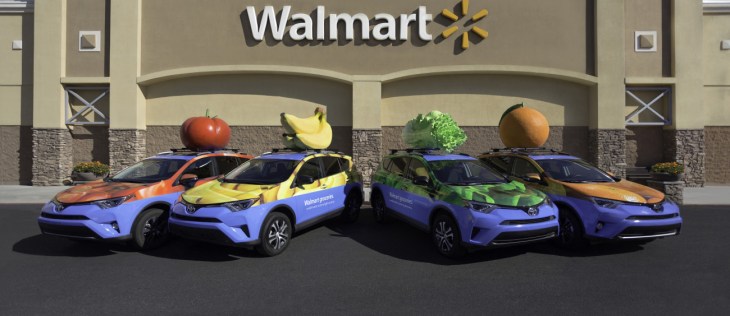In 2016, Walmart announced that it would begin testing grocery delivery in conjunction with Uber and Lyft.
Today, however, Reuters reports that those partnerships have come to an end, which was confirmed by Walmart and Uber.
TechCrunch first reported in 2015 about Uber’s plans to launch a merchant delivery system, wherein goods from retailers would be delivered (via the trunk) and Uber users would be transported to their destination simultaneously.
The deal with Walmart, alongside rival services like Lyft and Deliv, marked massive progress for this merchant delivery system. But things haven’t panned out long term.
“It is incredibly hard to deliver people and packages together,” said one of Reuters’ sources with a delivery company that works with Walmart and has direct knowledge of the matter. “They are two completely different business models.”
Walmart has a number of other channels through which it can offer delivery.
It has partnered with Postmates and DoorDash, but has excluded Instacart from its delivery partners list. According to Re/Code, Instacart was excluded from the partnership opportunity because Instacart wanted Walmart to list its retail items within the Instacart app, whereas Walmart wanted to use Instacart as a delivery partner while exclusively selling items on its own digital property.
This obviously comes at a time where the grocery delivery game is heating up. Amazon’s acquisition of Whole Foods has put pressure on incumbent grocery retailers to step up their digital presence and delivery capabilities.
Target acquired Alabama-based Shipt for $550 million in December of 2017. Meanwhile, Instacart has raised another $150 million this year, and recently announced a partnership with Walmart-owned Sam’s Club.
We’ve reached out to Uber and will update if/when we hear back.
Update: Uber has responded and provided the following statement:
UberRUSH fell under the team called “UberEverything” which is a collection of big bets, and the beginning of Uber as a platform. Recently we’ve been leveraging our platform into new products like Uber Eats, Uber Health or our aquisition with Jump Bikes. When we launched UberRUSH in 2014, we followed the same thinking, and wanted apply the model to help large and small businesses quickly and reliably move their goods.
After analyzing what made the most sense for our broader efforts, we decided to sunset UberRUSH worldwide on June 30th. Walmart has been an incredible partner for Uber these past few years and we have enjoyed serving Walmart’s customers and delivering their groceries through the UberRUSH platform. We are coordinating with Walmart to make this change as seamless as possible.
We’re already applying a lot of the lessons we learned together to our Uber Eats food delivery business. Since launching Eats two years ago, we’ve seen the business take off, growing through new markets, and forming new partnerships with restaurant owners around the world.
